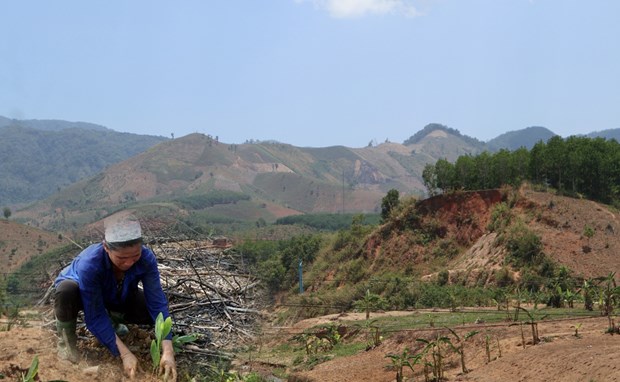.jfif) Opinion
Opinion


|
| The revised Land Law will focus on protecting and expanding land funds for ethnic minorities, addressing the issue of some regions depleting their land reserves for implementing land policies for ethnic minority communities. — VNA/VNS Photo |
Deputy head of the Land Department under the Ministry of Natural Resources and Environment Lê Văn Bình spoke about the Draft Land Law (amended), in which the priority solution is to reclaim land funds from organisations that use them ineffectively to return to local authorities for more efficient management and distribution among local residents.
Could you clarify what specific provisions in the draft amended land law were discussed in the 6th session of the 15th National Assembly regarding land policies for ethnic minority communities?
In the proposed amendments to the Land Law, there are clear provisions regarding land policies for ethnic minority communities. However, some of these provisions still lack the specific details needed to effectively implement these policies. To address this, the Ministry of Natural Resources and Environment has been working in collaboration with the Economic Committee and the Council of Ethnic Minorities of the National Assembly to enhance and refine the regulations related to land allocation for ethnic minorities.
Within these proposed amendments, there are significant changes to state policies regarding land for ethnic minority communities. These changes include the initial allocation of land and support for ethnic minorities who are landless or have insufficient land.
The draft law outlines the responsibilities of various authorities at the commune, provincial, and central levels while also clearly defining the necessary resources for the successful implementation of these policies. Notably, the draft law introduces additional provisions to deter violations of land policies concerning ethnic minorities. These provisions aim to prevent actions like the unauthorised transfer of land use rights, especially in cases where ethnic minorities receive land support but are not permitted to transfer those rights.
The overarching goal of these provisions is to protect and preserve land resources for ethnic minorities.
Furthermore, the draft law introduces regulations empowering the state to reclaim land for the purpose of establishing land funds for ethnic groups.
The law provides detailed guidance on land use planning, emphasising the importance of district-level land use plans in identifying land reserves for the implementation of land policies benefiting ethnic minority. These provisions are required to be integrated into annual land use plans.
Who are the specific targets outlined in the draft law for land reclamation and allocation, with the aim of supporting the development and production of ethnic minority communities, to ensure the effective implementation of these policies?
Currently, almost all our land has owners. If we want to create a land fund to allocate to ethnic minority, it is necessary to reclaim land from organisations and businesses currently using it.
In the coming time, the legal framework concerning land will primarily target organisations using land inefficiently or wastefully, including state-owned public entities. Especially for land funds used inefficiently by agricultural and forestry companies, the government will review, allocate, reorganise, and plan to allocate it to ethnic minority groups.
Any areas that companies or businesses are encroaching on, renting, or lending in violation of legal regulations must also be identified and returned.
Following these guidelines, the provincial People's Committees will evaluate and endorse the plan. Based on the land returned to the locality, the district People's Committees will manage the allocation for ethnic minority communities, addressing both residential and agricultural land needs.
In addition to the provisions safeguarding the land reserve, Resolution 18-NQ/TW on land policies has also emphasised the need for preferential policies for ethnic minorities. So, how has the current draft amended land law specified these requirements?
At present, the law provides clear provisions that involve ethnic minority communities being granted land for residential purposes, primarily within specified limits, with associated reductions in land use fees. In cases where ethnic minority individuals lose their residential land or encounter land scarcity, they are afforded the option to switch land from agricultural or other categories to residential use, provided it aligns with land use planning.
This conversion of land to residential use in line with the land use plan also entitles ethnic minority individuals to reduced land use fees.
Furthermore, if ethnic minority communities require non-agricultural land, the government will allocate land for their use, granting them land use fee reductions.
Following the approval of the draft land law (amended) by the National Assembly, what actions must the Government and relevant ministries, departments, and local authorities take to swiftly put the regulations regarding land policies for ethnic minority groups into practical effect?
To begin, the government must create detailed regulations to provide guidance for the implementation of the law. These regulations should contain specific provisions related to the allocation of residential and agricultural land for ethnic minorities, considering local conditions to ensure alignment with the effective Land Law.
In order to ensure that all levels, sectors, localities, and citizens are well-informed about the legal provisions, both central and local authorities need to intensify their efforts in disseminating and educating people about the law. This should target both administrative agencies and the general public.
Effective monitoring during the law's enforcement is crucial. The National Assembly, People's Councils at all levels, the Việt Nam Fatherland Front, and the public have the right to oversee the allocation of residential and agricultural land for ethnic minority communities, aiming for the most effective implementation.
Lastly, central and local authorities should allocate resources to sustainably review and allocate land reserves to support ethnic minority communities.
Successfully completing these tasks will help ensure that ethnic minority groups living in remote and mountainous regions can lead stable lives and have the necessary conditions for socio-economic development, ultimately contributing to sustainable poverty reduction. — VNS